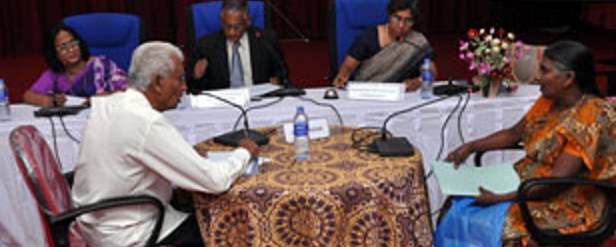[ Commission sittings]
◾Three man Presidential Commission submitsinterim report
◾ Reports that Ministry officials have been issued summons to appearbefore the Commission
◾ Report on domestic war crimes probe being drafted in consultation withinternational experts
The Ministries of Justice and Defence failed to comply with requests by the Presidential Commission on Disappearances to release a list of detainees in State custody, in displacement camps or rehabilitation centres, the three-man body complained in an interim report of its findings compiled this month.
In a press statement regarding its Interim Report, handed over to the President on 10 April, the Commission said it had made written requests to the Ministry of Defence and Ministry of Justice to release to the Commission names of persons who were in custody of prisons, detention camps, refugee camps, and rehabilitation centres.
“While noting with regret that such requests had not been complied with, the Commission decided to notice the respective officers to appear before the Commission in terms of the powers vested in the Commission by the Special Presidential Commission of Inquiry Act,” the three-man Commission said in its interim report.
According to the interim report, the Commission found that allegations of forced disappearances, abductions and arbitrary arrests have been made against the LTTE, security forces, armed groups and unknown groups.
“Based on the inquiries conducted thus far, accountability and responsibility by these parties vary from district to district, and in the Northern Province, 60% of the allegations were levelled against the LTTE, 30% against the security forces, 5% against armed groups and 5% against unknown groups,” the Commissioners noted in their report.
The Disappearances Commission said cases of forced disappearances and abductions alleged to have been committed by officers of the security forces, according to oral submissions made by relatives of missing persons, had been reported. These needed to be referred to the Attorney General for judicial action, the Commissioners state in their report.
The Commissioners also highlighted “grave incidents” that require in-depth investigation being reported based on oral submissions made at public sittings.
“These include the Sathurukondan and Eastern University Massacres of 1990; the massacre of 600 Policemen in 1990 in Ampara and the massacre of Muslim civilians in Kurukalmadam. The Commission has recommended that these allegations be further investigated by a special investigating team to gather credible evidence against person/s responsible in order to institute criminal proceedings according to domestic laws,” the interim report noted.
The Commissioners said they had sought to act swiftly where possible to issue death certificates and compensation to families through the relevant local authorities. The three man Commission also recommends a comprehensive program for counselling and psycho-social assistance for families in the north and east.
In July 2014, President Mahinda Rajapaksa extended the Commission’s mandate and tasked its members with investigating allegations of war crimes and violations of international humanitarian law during the final phase of the war in Sri Lanka. President Rajapaksa also appointed a five member Advisory Council to guide the Commission in its new mandate, including three senior international war crimes prosecutors on the panel.
The Commission in its Interim Report said that with regard to matters set out in its extended mandate, a report was being drafted in consultation with the Advisory Council. That report would be submitted as a separate report, the Commission said.
The three-member Commission comprising retired High Court Judge, Maxwell Paranagama as Chairman, Suranjana Vidyaratne and Mano Ramanathan made its observations following its conduct of 11 Public Sittings in Kilinochchi, Jaffna, Mullaitivu, Batticaloa, Mannar, Trincomalee, Vavuniya and Ampara, and discussions with various stakeholder groups.
By April 9, the Commission had received 16,153 complaints from residents in the Northern and Eastern Provinces and 5,200 complaints from the families of security forces personnel, the interim report stated. (DB)
FT
